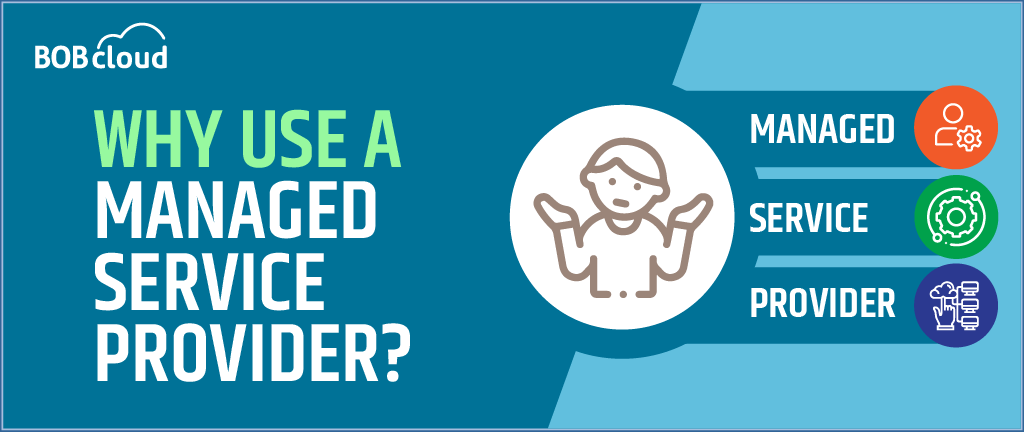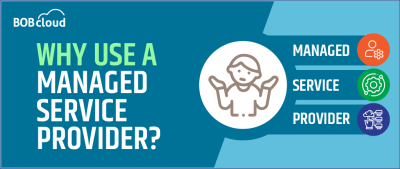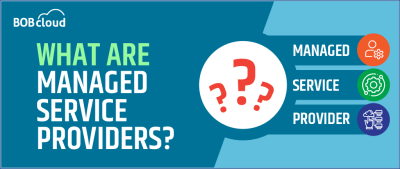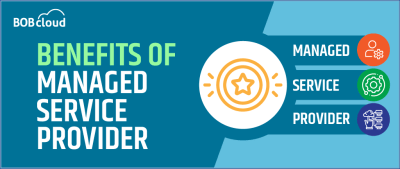Why Use A Managed Service Provider?
Reliable and secure IT systems are crucial for business operations. Running your internal IT infrastructure is costly, time-consuming and risky. Many businesses prefer outsourcing IT requirements to a managed service provider (MSP).

A managed services provider (MSP) is an organisation that offers IT solutions to other organisations. Such services typically contain cloud computing, data backups, network security, software updates and helpdesk facilities. When you enter a contract with a managed services provider (MSP), they will cover everything and focus on your primary activities. At the same time, the professionals deal with other IT-related things.
We will explore the current business environment, difficulties for organisations without MSPs, Why Use a Managed Service Provider and how MSPs can address such challenges. We will also provide some case studies of companies that have used MSPs successfully.
The Role of MSPs in Modern Businesses
MSPs are more than just service providers – they become strategic partners assisting businesses in reaching their objectives. Here are some ways MSPs can improve your business:
- Support remote work: With the surge in remote positions since the COVID-19 pandemic, it is crucial to ensure employees can work from anywhere without compromising productivity or security. MSPs can help set up and manage cloud-based solutions, allowing staff to access files, applications, and communication tools from any device and location. They also handle monitoring and troubleshooting for remote workers’ IT systems.
- Ensure Cybersecurity: MSPs provide more than technical support; they help businesses fulfil their objectives. Here are some ways MSPs can enhance your business: MSPs deal in data security and systems by employing security measures such as firewalls, antivirus software, encryption, and backup. Besides, they are involved in human error prevention workmanship and training programs for security staff.
- Keep up with technology: Technology evolves continuously, presenting opportunities and challenges. Businesses must adopt the latest technologies to remain competitive. MSPs facilitate this by providing access to advanced tools and solutions. They also offer guidance on utilising these technologies to optimise business processes and outcomes.
Challenges Faced by Businesses Without MSPs
Businesses managing their IT encounter several challenges that can interrupt performance and growth:
- High costs: Self-managing IT involves substantial investment in hardware, software, staff, training, and maintenance. These unpredictable and variable costs make planning and resource allocation difficult.
- Lack of expertise: IT is complex and requires specialised knowledge. Finding and retaining qualified IT staff is challenging, and staff must continually update their skills to keep pace with evolving technology trends.
- Downtime: IT systems downtime can result in lost revenue, customer dissatisfaction, reduced productivity, and damage to a business’s reputation. Preventing and resolving downtime demands constant monitoring, maintenance, backup, recovery, and contingency planning.
How MSPs Address These Challenges
MSPs provide solutions to these challenges by offering the following benefits:
- Cost savings: Outsourcing IT to an MSP reduces capital and operational expenditures. Businesses pay only for the services they use, with a predictable monthly fee covering all IT services, avoiding unexpected costs due to downtime or security breaches.
- Expertise: MSPs grant access to a team of highly skilled IT professionals with expertise in the latest technologies and industry best practices. Eliminating concerns about finding and retaining IT staff and keeping them updated through training and certifications resolves potential challenges.
- Reliability: MSPs use advanced tools to monitor, maintain, and troubleshoot IT systems 24/7, ensuring optimal functionality. They also provide backup and recovery services to safeguard data in emergencies, along with contingency plans to minimise the impact of downtime.
For more information, check out our comprehensive article on the benefits of using a Managed Services provider.
The ROI of Investing in an MSP
MSP is an excellent way for companies to address their cyber threats, and businesses that do not invest in this service do so at their own risk.
The precise computation of ROI (Return on Investment) can be intricate, but the pros are important. Here’s how an MSP can contribute to a positive return:
- Reduced Costs: Digitally record the recurrent costs for employing in-house IT staff, buying hardware and software, and performing continual maintenance with the fixed monthly charge of a managed service provider (MSP). Integrate the potential savings caused by the reduced downtime and security breaches taken into consideration.
- Increased Productivity: Employees minimise IT issues and break time and concentrate on primary tasks.
- Improved Security: MSPs draw their strength from their advanced resources and expertise, which allows them to reduce the dangers of costly data breaches.
- Strategic Advantage: This results in a situation where companies can leverage advanced technologies and receive professional assistance, which helps them devise novel concepts and develop a competitive advantage.
Remember that ROI is multifaceted and does not encompass cost savings only. Take note of a high degree of performance improvement due to better morale, absolute peace of mind, and the habit of focusing on significant business duties.
The Future of Managed IT Services:
The future of managed IT services is bright, driven by several trends: The future of managed IT services is bright, driven by several trends:
- Cloud-Based Solutions: With the increasing cloud adoption, MSPs will expand to deliver cloud management services effectively.
- Focus on Security: The MSPs will broadly supply advanced security methods and expertise due to increased cyber threats.
- Artificial Intelligence (AI) and Automation: Through AI, MSPs can perform automated monitoring and predictive maintenance, which allows them to go from reacting to being proactive.
- Strategic Partnerships: MSPs are shifting from providers to partners collaborating more intensively due to the business alignment in the goals.
The key is to ensure an always up-to-date services portfolio. MSPs will boost the value proposition and become indispensable companions for any company, regardless of size.
The Future of Managed IT Services:
Wasted costs from improper or inefficient IT infrastructure management are almost always much higher than the investment required for an MSP engagement.
One notable aspect is the price of cooperating with MSP. Of course, this does not justify neglecting your IT infrastructure, as this would cost you a fortune in the long run. Here are some potential costs:
- Downtime: This interferes with workers’ productivity, distresses employees, and incurs financial loss from system outages.
- Security Breaches: Data breaches can be very costly, resulting in fines, court processes, or a reduction of brand value.
- Reactive IT Management: You can’t maintain the need to react to preventive actions and respond to unwanted situations.
- Missed Opportunities: Due to a mismatch in technology, expertise, and information, businesses must catch up to competitors.
Aware of these unanticipated costs, partnering with an MSP allows companies to treat their IT infrastructure at the strategic asset level, not the problem we run from.
5 Signs Your Business Needs an MSP
We list down the five signs that may indicate that it is the right time to seek the service of an MSP.
- Your IT Team is Constantly Putting Out Fires: Are your IT team’s reactive solutions consuming their productive time, or are they proactive in implementing preventive techniques?
- Security Concerns Keep You Up at Night: Are you concerned about whether your current policies are up to date with the latest cybersecurity threats or whether you have access to a professional with the appropriate knowledge and experience to handle these risks?
- Technology is Slowing You Down: Is old technology an obstacle to your business expansion or prevents you from adapting to new needs?
- Your IT Costs are Unpredictable: Don’t let that write off your budget because of unexpected expenses.
- You Need a Strategic IT Plan: Whether your firm needs to be more precise about the role of IT in achieving its overall goals, using real-life examples of success will be beneficial.
Suppose you have been able to respond to any of the questions with a Yes. In that case, an MSP automatically becomes the right business partner who can work towards improving your IT services and achieving your business milestones.
Conclusion
Choosing an MSP is prudent for any business aiming to optimise IT performance and achieve its goals. By outsourcing IT needs, companies can reduce expenses, access skilled professionals, and ensure continuous, secure IT operations.
MSPs provide peace of mind, allowing businesses to focus on core activities and leverage the latest technologies for innovation and differentiation.




